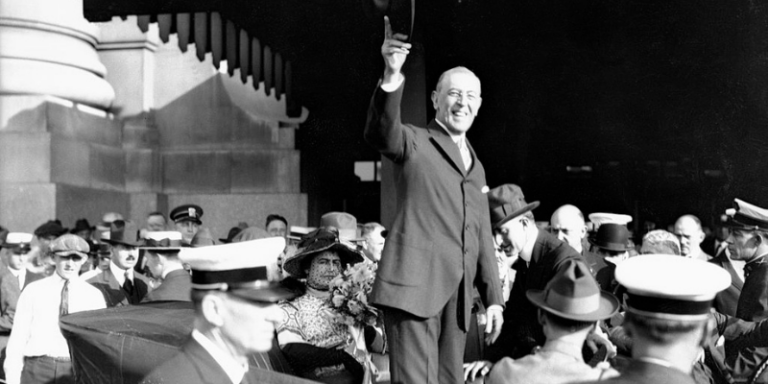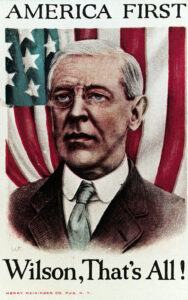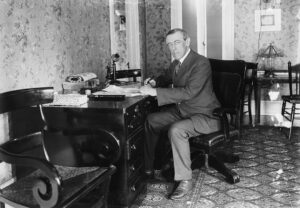Woodrow Wilson: A War-Torn President
President Wilson tried to keep America out of World War I during his first term – but asked for war in his second.
By: Kelli Ballard | February 5, 2021 | 625 Words

President Woodrow Wilson in St. Louis, Missouri, on a speaking tour to promote the League of Nations. (Getty Images)
The 28th president, Woodrow Wilson, was born December 28, 1856, in Staunton, Virginia. He studied law and received a Ph.D. in political science from Johns Hopkins University. He became a professor of jurisprudence and politics at Princeton in 1890 and served as president of the university from 1902 to 1910. He was the only U.S. president to earn a doctorate, and, oddly enough, the young Woodrow did not even learn to read until he was ten – some suggest dyslexia played a role.
In 1910, he began his political career and was elected governor of New Jersey. Just two years later, the Democrats nominated him for president.

(Getty Images)
Wilson’s First Administration
Wilson was the last American president to travel to his inauguration ceremony in a horse-drawn carriage. During his first administration, the new president worked on progressive reform. Under the Underwood-Simmons Act, tariffs on imports were reduced, a new federal income tax was imposed, and the Federal Reserve and Federal Trade Commission were established.
A Step Backward
While serving as president of Princeton, Wilson prevented black students from enrolling in the university. As U.S. president, he supervised the resegregation of many areas of the federal offices, including the Navy, the Interior, Post Office, and the War Department. On the other hand, he nominated Louis Brandeis to the U.S. Supreme Court, the first Jewish person to be confirmed by the Senate.
The World War
World War I broke out in 1914, and the president was determined that the U.S. would stay out of the conflict. On May 5, 1915, a German submarine torpedoed the British ocean liner Lusitania, sinking it and killing more than 1,100 people, including 128 Americans. Wilson warned that any future attacks would be viewed as “deliberately unfriendly.”

In 1916, Wilson was renominated by the Democrats with the campaign slogan, “He kept us out of War.” But that only lasted until he began his second term.
Wilson’s Second Term and the War
In 1917, German submarines launched more attacks against U.S. merchant ships. The United States also learned about the Zimmerman Telegram, which showed Germany trying to get Mexico to go against the U.S. On April 2, 1917, Wilson asked Congress to declare war on Germany, saying, “The world must be made safe for democracy.” On November 11, 1918, the Germans signed an armistice to end the war.
Much of Wilson’s second presidential term was consumed by the war, but he did work hard to negotiate the Treaty of Versailles, which included plans for the League of Nations to help settle international disputes and hopefully prevent future wars. But the idea was not met well, so Wilson decided to travel and bring the idea to the American people. On September 25, Wilson was on a train heading to Wichita, Kansas when he collapsed from exhaustion. On October 2, he had a stroke that left him partially paralyzed. The president’s medical condition was hidden as much as possible from the people.

(Getty Images)
In December 1920, Wilson received the 1919 Nobel Peace Prize for his Treaty of Versailles and League of Nations work.
Wilson’s second administration saw Prohibition begin on January 17, 1920, by the power of the 18th Amendment. Wilson vetoed the National Prohibition Act, which would enforce the Amendment. Congress overrode his veto and Prohibition lasted until the 21st Amendment repealed it in 1933.
Wilson wanted Congress to give women the right to vote. In 1920, the 19th Amendment was passed and became law, making it legal for women throughout the United States to be able to vote.
On February 3, 1924, at the age of 67, Wilson died at his home. He was the only president to be interred in the nation’s capital when he was buried in the Washington National Cathedral.
















